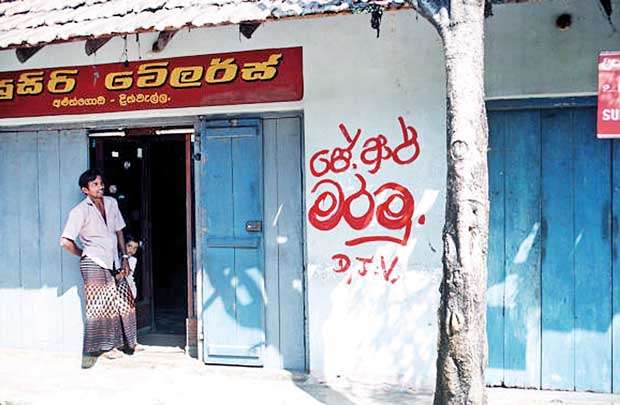Reply To:
Name - Reply Comment
Last Updated : 2024-04-18 14:23:00

How States resort to extra-judicial killings while keeping a moratorium on Death Penalty
Why the opposition to capital punishment by politicians is nothing but the best manifestation of hypocrisy
 When Parliamentarian Hirunika Premachandra brought an adjournment motion in Parliament for the implementation of Capital Punishment in October 2015, the then Justice Minister Wijeyadasa Rajapakshe had to give an assurance to the International Community that Sri Lanka would not implement the death sentence.
When Parliamentarian Hirunika Premachandra brought an adjournment motion in Parliament for the implementation of Capital Punishment in October 2015, the then Justice Minister Wijeyadasa Rajapakshe had to give an assurance to the International Community that Sri Lanka would not implement the death sentence.
But now, the same Government has decided to do so.
Strangely, no political party in the country has officially protested against the decision. In a way, the Sri Lanka Podujana Peramuna (SLPP) might be happy about the decision as they would be able to use it against their opponents in future if they came to office.
If the incumbent Government started to implement the decision, one couldn’t expect others, especially the SLPP, to reverse it once they assume power.
As in the case of introducing a new tax regime, the Government is helping the future Governments by taking a difficult decision to hang convicts.
Also, there are no signs of strong and clear opposition on the part of the religious leaders either, except for the Anglican Church of Ceylon, which had on Tuesday announced its disagreement and the Catholic Archbishop Malcolm Cardinal Ranjith, who had denied media reports, though belatedly, that he had supported the Government’s decision. Interestingly, the Jathika Hela Urumaya (JHU), which claims to be following Buddhist Philosophy had brought a motion during the last Western Provincial Council meeting endorsing the implementation of the death penalty.
While Human Rights organizations here and abroad and in some foreign countries, including the European Union, are not in favour of Sri Lanka implementing the death penalty, the general public in the country seem to be endorsing it.
President Maithripala Sirisena, while announcing the Government’s decision on the matter last week stated that capital punishment would be carried out only on those who continue drug trafficking, even after they were convicted and incarcerated for the offence.
But contradicting the President’s statement, UNP Ministers said that the decision was made in respect of all drug-related convicts. In the light of the harm these drug peddlers and traffickers commit to our future generations in particular and society in general, and the obstinacy of those behind bars to change themselves, many tend to justify the Government’s decision.
But the move raises many questions.
First of all the President’s explanation is an admission of his Government’s failure in Prison Administration. It is obvious that prisoners cannot access mobile phones or drugs or any other prohibited material without the support of Prison Officials. But it is common knowledge that they have all these facilities in Prisons. Despite increasing reports about prisoners using drugs, phones and weapons, bribing officials and misusing the Prison Hospital being carried in the media for years, no action is being taken to prevent those illegal acts. If the Government genuinely takes action to clean the Prison Administration and prevents illegal acts, such as mobilising drug business from within the prisons, there wouldn’t be any necessity to hang anybody.
It goes without saying that the death sentence has never and nowhere totally deterred serious crimes such as rape and murder. Nor have the other punishments totally eliminated other crimes either. Many factors including education, culture, poverty and effectiveness of law enforcement mechanism contribute to the deterrence or proliferation of crimes.
The Jathika Hela Urumaya (JHU), which claims to be following Buddhist Philosophy had brought a motion during the last Western Provincial Council meeting endorsing the implementation of the death penalty.
Thus the effectiveness of capital punishment in the elimination of crimes is an obscure factor. Therefore, the suitability or unsuitability of it is also a matter that could be eternally argued.
Apart from the contention that the death sentence cannot serve as a means to make a man to repent since he would be no more to do so once the punishment is meted out, there is a danger of sending innocent persons to the gallows, due to the miscarriage of justice. So many unfortunate men had been exonerated decades after they were executed or incarcerated in other countries. Judges and prosecutors could later regret, but could not give the victims their lives or the youth incarcerated with them. Nor can they mete out justice to the original rape or murder victims of these cases.
Nevertheless, the opposition to the implementation of capital punishment by many politicians is nothing but the best manifestation of hypocrisy.
That could be corroborated by their behaviour during politically turbulent times in the country. During every regime after 1970, leaders of almost all political parties-ruling or Opposition- have resorted to extrajudicial killings or endorsed them, while the country maintained a moratorium on capital punishment. It was reported that as many as 20,000 youths were killed at the hands of the State Armed Forces during the first insurrection of the Janatha Vimukthi Peramuna (JVP) in 1971.
Many of them died on what was then called “tyre pyres” that were introduced in the country for the first time. That was the time people had seen human bodies floating in rivers for the first time as well. These bodies on tyre pyres and rivers were not of those killed in fighting or crossfire between the Armed forces and the Insurgents, rather, most of them had been killed after being captured.
Despite these murders being illegal, never a member of any of the then ruling parties- Sri Lanka Freedom Party (SLFP), Lanka Sama Samaja Party (LSSP) and Communist Party of Sri Lanka (CPSL) had regretted them.
These killings were committed as a method of capital punishment for the victims’ alleged involvement in the insurgency or sometimes for the mere moral support for it.
President J.R. Jayewardene during his attempt to crush the Northeast Tamil rebellion set December 31, 1979, as a deadline for the then Security Forces Commander Jaffna T.I. Weeratunga to clear Jaffna of rebels, especially the Liberation Tigers of Tamil Eelam (LTTE). The Jaffna commander failed to meet the deadline but the people of Jaffna saw many human bodies floating in the Jaffna Lagoon. However, Jayewardene’s successor Ranasinghe Premadasa decimated the southern rebels with an iron hand. It was during his tenure, the found mass graves were first introduced in the North as well as the South. The discovery of the mass grave of 31 school children at Sooritakanda in 1994 and the reports of massacres of hundreds of people in places such as Kokkattichcholai in the East were emblematic cases.
Despite the southern rebellion being still called JVP bheeshanaya, the number of extra-judicial killings in the South by the State Armed Forces and the vigilante groups - PRRA and the Green Tigers-was placed at more than 60,000 by the then Human Rights activists such as Mahinda Rajapaksa and Vasudeva Nanayakkara. We cannot recall any Human Rights activist or organization, here or abroad officially calling for a probe on the killing of Rohana Wijeweera, the founder leader of the JVP. There is no doubt that all these murders were a method of capital punishment carried out for expressing views or acting against the State machinery, while a relatively small number of death sentences delivered by courts were under a moratorium. During the Operations Riviresa and Sathjaya in 1995/1996 it was alleged that more than 600 people had been made to disappear apart from those killed in action. The allegations of extra-judicial killings and disappearances during President Mahinda Rajapaksa’s tenure finally landed the country in a UNHRC mess and the Paranagama Commission that probed the disappearances had recorded more than 19,000 cases in the north- east alone. On the other hand, the brutalities of the LTTE and the JVP too were second to none.This is the case with the so-called International Community as well. More than 9,000 Iraqi surrendered soldiers were buried alive during the first Gulf War in 1990/91. This was the concern for the human lives by those who protest against the capital punishment.

Add comment
Comments will be edited (grammar, spelling and slang) and authorized at the discretion of Daily Mirror online. The website also has the right not to publish selected comments.
Reply To:
Name - Reply Comment
On March 26, a couple arriving from Thailand was arrested with 88 live animal
According to villagers from Naula-Moragolla out of 105 families 80 can afford
Is the situation in Sri Lanka so grim that locals harbour hope that they coul
A recent post on social media revealed that three purple-faced langurs near t